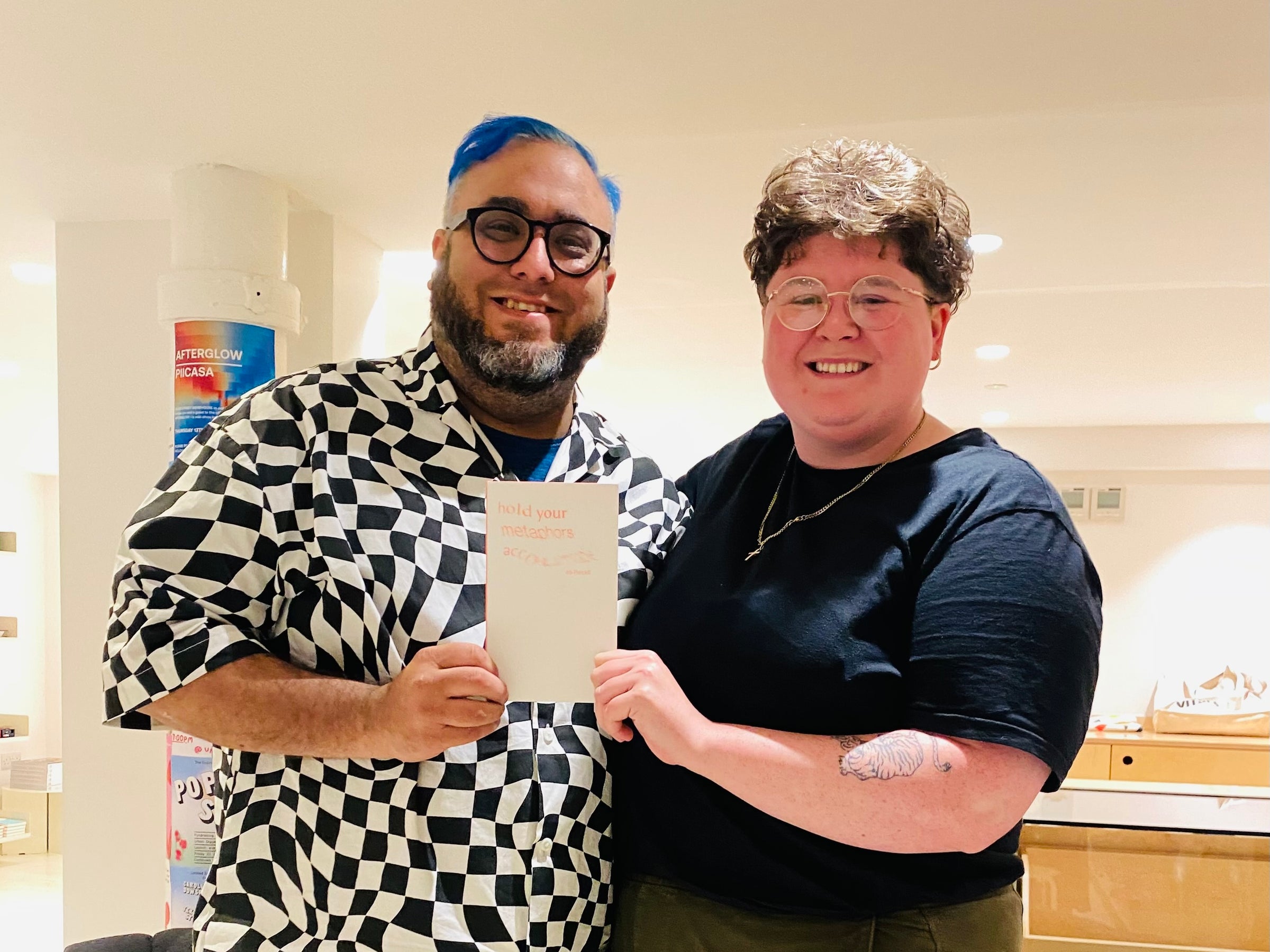
On the 21st of June, we were joined by Ab Parcell to launch her debut poetry collection Hold Your Metaphors Accountable. It was great to listen to Ab in conversation with fellow poet Chris Cambell, to hear some poems from her collection performed live, and to see this beautiful book in person for the first time!
Hold Your Metaphors Accountable is as striking and delicate as the poetry contained within it. Riso printed by Team Trident Press, the book contains Maria-Rose Wilson's abstract paintings, is interspersed with fragile tissue paper pages, and is bound by a pink elastic band. It was great to be a stop on Ab’s book tour and to host our first-ever poetry launch at UNITOM, especially with such an engaging and talented local writer.
Ab is currently the writer in residence at Manchester’s Portico Library (which is the next stop on the tour, followed by Brighton), she very kindly agreed to answer some questions for us about queer poetry, building a collection, butch identity, and much more! We hope you enjoy getting to know Ab and her writing as much as we have.
Hey Ab, your book tour is well underway, how did preparations go?
Hey! It’s been good I’ve been enjoying it whilst trying not to overthink things! I kind of ran away to Paris for a few days and that distracted me but it’s all good now!
How have you found the process of putting together your first collection, has it been challenging?
Absolutely it was a challenge. I think trying to narrow down enough of your work for a collection at any stage of your career comes with its obstacles. But it was a very cathartic experience for me.
What does your writing routine usually look like?
I can write anywhere any time I don't really have a routine. I do tend to carry around a little notebook everywhere I go. And if I think of something or overhear something k write it down. It may make it into a poem or piece of prose but it may not but it's good to keep ideas flowing.
You describe your writing as ‘hybrid auto-fiction, could you talk a little about what that means?
Hybrid autofiction is a literary genre that combines elements of autobiography and fiction with poetry. It blurs the boundaries between the author's real-life experiences and imaginative storytelling, creating a unique narrative that intertwines fact and fiction. The author draws inspiration from their own life, incorporating personal memories, events, and emotions into the story. They often feature themselves or fictionalized versions of themselves as characters in the narrative. These characters may interact with other fictional characters or navigate fictionalized scenarios and settings.
How is your relationship with the speaker of your poems?
It's a rough one. I love and hate her sometimes.
Do you have an audience or ‘ideal reader’ in mind as you write poetry, or does that come later?
I write for my partner mainly, haha.
I love the title ‘Hold Your Metaphors Accountable’. We’re seeing more conversations around the ethics of poetry and how metaphor can be used and abused depending on who is doing the comparison (and to what!). How have you held your metaphors accountable in this book?
Oof. I mean Imagine a metaphor as a graceful dancer, twirling across the stage of language, enchanting our minds with its elegance and beauty. It weaves intricate patterns, evoking emotions and painting vivid pictures in our imagination. But amidst the enchantment, there comes a moment when we must hold this metaphor accountable, much like a strict but fair judge presiding over the court of meaning.
To hold a metaphor accountable is to subject it to scrutiny, to question its intentions, and to demand clarity in its expression. Like a skilled interrogator, we ask the metaphor to reveal its true nature, to shed its veils of abstraction and unveil the essence it attempts to convey.
Sometimes a metaphor may frolic too freely, leaving behind a trail of confusion in its wake. It dances in elusive beauty, wrapping meaning in enigmatic layers that resist easy interpretation. In those moments, we hold it accountable by urging it to step out from behind its enchanting facade. We challenge it to clarify its intentions, to align its symbolic gestures with the realm of understanding, and to ensure that its message resonates authentically.
To hold a metaphor accountable is to seek honesty and authenticity in its portrayal. It requires us to examine the metaphor's suitability for the context in which it is employed. Does it truly capture the essence of what it seeks to represent? Is it sensitive to the nuances and complexities of the subject matter? We must be vigilant in recognizing when a metaphor may fall short, when it may misrepresent or oversimplify, and to challenge it to rise to a higher standard of accuracy and insight.
Yet, in this pursuit of accountability, we must not stifle the metaphor's creativity or strip it of its poetic power. We recognize that metaphors, like all artistic expressions, possess a certain degree of fluidity and subjectivity. They have the capacity to transcend literal interpretation, evoking emotions and capturing elusive truths that defy rigid definitions.
So, to hold a metaphor accountable is to strike a delicate balance between critique and appreciation, between demanding clarity and preserving the magic of its artistic expression. It is an act of intellectual engagement, an invitation to the metaphor to illuminate, inspire, and enrich our understanding. Through this process, we honor the metaphor's transformative potential while ensuring that it serves its purpose of deepening our connection with the realms of meaning it seeks to explore.
Do you have a favourite poem from this collection, or is there one poem that the others were built around?
Absolutely psychosis/religion. This was put in just before it went to print and is a fantastic representation of the space I'm moving into as a writer.
I love your poem ‘Baby Butch Rising’, it’s great to hear more and more butch voices taking up space in the poetry world. How does butch identity and culture influence your writing?
In the vast landscape of poetry, where words bloom like wildflowers and emotions flow like untamed rivers, the presence of a butch poet stands as a beacon of significance. Imagine a majestic oak tree standing tall amidst a meadow of delicate blossoms, its sturdy branches reaching for the sky with unyielding strength. Being a butch poet is important because it adds a powerful and distinct voice to the ever-evolving tapestry of artistic expression.
Like a prism, a butch poet refracts the light of their experiences through the multifaceted lens of their identity. They embrace their masculine energy, unapologetically defying societal expectations and challenging the confines of gender norms. In doing so, they shatter the glass ceiling of traditional poetic representation, opening doors to unexplored realms of possibility.
Through their words, a butch poet navigates the complexities of their existence, capturing the nuances of their journey with authenticity and grace. They paint vivid landscapes with their verses, imbuing them with the bold strokes of their unique perspective. They carve out spaces where their voice can resonate, carving new paths in the literary world, unafraid to be seen and heard.
Being a butch poet is important because it gives voice to narratives that have long been marginalized or overshadowed. They become a bridge between communities, weaving together threads of shared experiences, and dismantling barriers of understanding. Their poetry becomes a vehicle for empathy, carrying the reader on a journey of self-discovery and transformation.
In their verses, a butch poet celebrates the beauty of queerness, offering solace and inspiration to those who may feel invisible or silenced. They become beacons of hope, reminding others that their stories, their struggles, and their triumphs are valid and worthy of expression. They carve out spaces where individuality can thrive, where diversity is cherished, and where the boundaries of expression are pushed beyond the horizon.
The importance of being a butch poet lies in the ripple effect it creates. Their words resonate not only within their own community but also in the hearts and minds of those who may have never encountered such perspectives before. They challenge preconceived notions, expand the boundaries of imagination, and create a richer, more inclusive literary landscape for all.
So, let us celebrate the butch poet—the poet who dares to embrace their authentic self, who dances fearlessly between the lines of tradition and identity. They remind us that poetry is not confined by gender, that beauty knows no bounds, and that every voice, in its unique expression, has the power to shape the world.
Maria Rose Wilson’s illustrations are beautiful. It’s quite unusual to include paintings in a poetry collection, what made you want to work with an artist?
Maria is family and I don't think I could've written most of the collection without her pep talks.
You have been fundraising for the Partisan Collective as part of this launch, could you say a little about what they do and how they helped you with publishing Hold Your Metaphors Accountable?
So Team Trident Press run out of Partisan and they published the collection which came out beautifully! Partisan is a place that's very dear to me and I just wanted to help in any way that I could really.
You’re also the Writer In Residence at Manchester’s Portico Library, how is your residency going?
I have free reign of a gorgeous 18th century library it's the dream.
What are you reading at the moment?
Nick Cave’s faith hope and carnage.
Do you have a writing hero? Or perhaps a poet whose work has had the greatest influence on your own poetry?
It's gotta be Leslie Fienberg, even though I haven't finished Stone Butch Blues because it's breaking my heart.
What’s the best bit of writing advice you’ve been given?
Less is more.
You go to some dark places in your poetry, but I would say that the overall feeling is one of defiance and hope. What do you hope people take away from this collection?
That no matter how shit things may get, there's always a way out. And the importance of community within that process.
What do you like to do when you aren’t writing poetry?
Not a lot to be honest. Maybe sitting with my cat.
Finally, do you have an idea of what your next project might be?
I'm just starting a PhD with Salford uni in creative writing and I'm hoping to have a novel written by the end of that!
Thank you so much for chatting and congratulations again on this wonderful debut!






